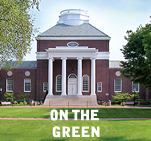
![]()

Teachers test new genetics curriculum

![]()

Teachers test new genetics curriculum
In an e-mail to his friend Megan, Joe wrote, “I’ve learned more from the doctor and the genetic counselor about this condition I might have. If the test is positive, I will probably have to quit playing soccer. We were hoping I’d get a soccer scholarship to college. What should I do, Megan?”
The possibility that Joe may have inherited a disorder known as Marfan syndrome, which affects the body’s connective tissues found everywhere from the joints to the eyes, and his dilemma over whether to undergo genetic testing is one of the real-world situations that Delaware seventh-graders will encounter in the new genetics curriculum,
“Our Genes, Our Selves.” The DuPont Co. provided primary funding for the new curriculum, with additional support from AstraZeneca. The Delaware Foundation for Science and Mathematics Education also helped bring the new unit on genetics to Delaware classrooms.
Last fall, 43 middle-school teachers from across the state, including instructors of science and special education, took a hands-on tour of the new genetics unit at the Delaware Biotechnology Institute. The institute and the Delaware Department of Education sponsored the workshop, with financial support from the National Science Foundation’s Experimental Program to Stimulate Competitive Research (EPSCoR).
Delaware EPSCoR was established in 2005 through a competitive grant from the National Science Foundation and funding from the state. It is a partnership of the Delaware Biotechnology Institute, UD, Delaware State University, Delaware Technical and Community College and Wesley College and is designed
to help advance the state’s capabilities in bioscience and biotechnology.
The new lessons, produced by the Science Education for Public Understanding Program at the University of California at Berkeley’s Lawrence Hall of Science, involve students in the process of science—asking questions, collecting and analyzing data and making decisions based on evidence—through a rich combination of experiments, readings, models, debates and role-playing activities.
“As new and better curricular resources become available, we provide them to teachers in workshops like this,” says Gwyneth Sharp, a science specialist for the state education department. “The idea, as the National Science Foundation has said, is to make sure that teachers have both the materials and the training they need to provide the most effective instruction in the classroom. We give them the tools and the framework. This really brings out the art of the teacher in how those science lessons are then delivered to engage students.”
The teachers reviewed a continuum of topics and activities from Mendel’s genetic studies of pea plants in the 1860s to present-day DNA fingerprinting, took part in experiments, reviewed the full-color student classroom guide, wrote in their journals, discussed role-playing activities and shared ideas and tips.
Tom Janeka, AS ’97, an award-winning science teacher at George V. Kirk Middle School in Newark, says he took away a number of new ideas from the workshop as well as new assessments for monitoring their progress.
“It’s comforting to have programs like these, to have teachers do new things or to put a new spin on old things,” Janeka says. “It’s good for us and for our students.”